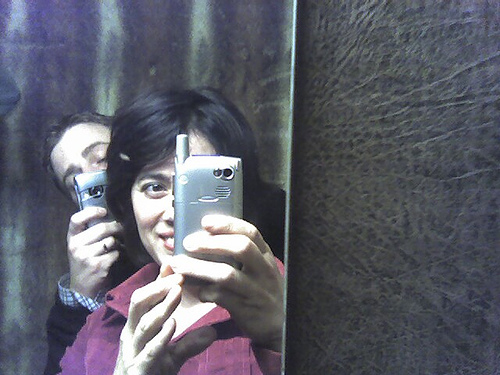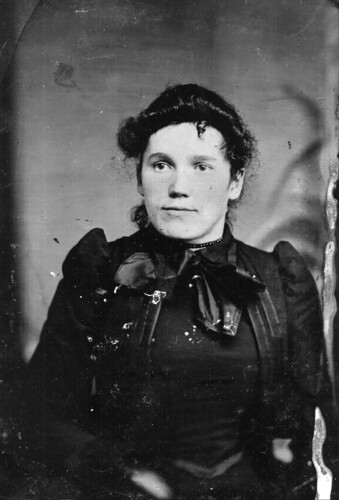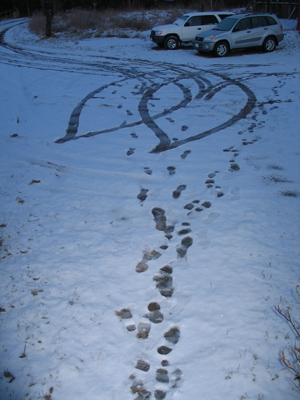January 31, 2006
January 30, 2006
If you have an enterprise before you, try it in your old clothes
A post to 43 Folders points me to this wonderful bit from Walden:
I say, beware of all enterprises that require new clothes, and not rather a new wearer of clothes. If there is not a new man, how can the new clothes be made to fit? If you have any enterprise before you, try it in your old clothes. All men want, not something to do with, but something to do, or rather something to be. Perhaps we should never procure a new suit, however ragged or dirty the old, until we have so conducted, so enterprised or sailed in some way, that we feel like new men in the old, and that to retain it would be like keeping new wine in old bottles. Our moulting season, like that of the fowls, must be a crisis in our lives. (Chapter 1)
January 29, 2006
links for 2006-01-29
-
Teresa Nielsen, with MANY comments
-
Jamais Cascio asks for and gets suggestions
January 28, 2006
January 27, 2006
links for 2006-01-27
-
sheer bloody genius from Brian Lamb and Alan Levine, conference presentation reinvented
-
Photo Dictionary of Japanese Buddhist & Shinto Deities
January 26, 2006
On the Photobooth in Demotic Photography
Consider this spectacular image, from this morning's Flickr Nation:

(I hope I'm doing this right, CC-wise: this one is by Caterina Fake herself (www.flickr.com/photos/caterina/91282844/).
I'm a latecomer to the notion that there's something deeply significant in this medium, but I want to start a thread on the side to track it. Among others whose work precedes and informs this effort, I'm especially indebted to Photobooth, Babbette Hines' glorious collection of "discarded images of men and women who crowded into photo booths to capture a moment on a little strip of film". I have very few photobooth bits in my own collection, but there are two from the Joe Wilner trove:
 and
and 
It's paradoxical that these share something with a few of the tintypes --a sort of artlessness in the pose that really conveys something about the essence of the person. Consider this one:
These are probably separated in time by something like 60 years, about as much time as separates the later ones from now.
I'm still hunting for whoever has analyzed the chronotope of the photobooth experience, the 1-2-3-4 exposures, with enough time between for the subjects to alter their pose/presentation, and about how people developed that temporal opportunity over the years. I have Babbette Hines' book on order, and that may be just what I'm seeking.
It's also necessary to explore what's already out there on the Web, and a quick Google search nets a bunch: photobooth.net ("We aim to make this the most comprehensive photobooth resource on the internet..."), Wade's Photobooth Gallery, the Flickr photobooth Group, Mr.Mixup's Photobooth Archive (U.K.), just to start with...
Anyway, this is an open thread, to which I'll add as I learn more.
January 25, 2006
links for 2006-01-25
-
Arctic ice mashup ("Developing Arctic Modelling and Observing Capabilities for Longterm Environmental Studies")
January 24, 2006
Betsy's comment on the Canadian election
"One nice thing about democracy is that you can have a change of scoundrels."
January 23, 2006
Department of Co-Incidence
My friend Joan Larcom replied to a howyadoin message (which had included a pointer to Nova Scotia Faces) with this:
...The similarity I mentioned relates to your project onHere's the Lesy quote:
Nova Scotia faces because I've only begun to think
about doing something similar with my family stuff.
This interest was piqued by an article in the NYT on
Dec 17th about Michael Lesy's "Angel's World" on
Angelo Rizzuto. Lesy is proposing "demotic"
photography or a closer look at family photos and
picture postcards. 'UNpacking' them sort of.
In the past, Mr. Lesy has ruffled some academic feathers by arguing that what he calls "demotic photography," like family snapshots or picture postcards, deserves the same level of scholarly study traditionally given only to art photography... "my whole intention is to subvert the [art photography] canon... There are possibilities that go beyond the safe definitions of what an artist is and what the camera is used for. ...Academics... deal with photographs as aesthetic, intellectual constructs, or as integers in philosophical or linguistic argument. That's not all they are. They're slippery and deeply emotionally charged. A photograph is a thing which, to use an old scholarly word, needs to be 'unpacked.' There's the manifest content, then half a dozen layered contents."I like the flavor of "demotic", which underscores the everyday, personal, hands-on qualities of family photographs. A Google search for "demotic photography" gets just 3 hits ("vernacular photography" nets 24,000).
(NYT 17 Dec 2005 sec B pg 9)
One of those (besides the one pointing to the NYT Lesy quote) is a 1993 article from The Nation, which includes this provocative bit:
the Dada contribution to art was the photomontage, assemblages of photographic fragments that more or less assume an unlimited supply of images no more valuable than the paper on which they are printed, and that are readily understood by everyone, since they form the vernacular visual vocabulary of the culture.One seeks to link to bits of story, of narrative or myth or expression. Consider the page of found images from In the Booth at squareamerica.com, each a scrap of the past, and more or less decodable, thanks to a common "vernacular visual vocabulary." Each image serves as a momentary intersection with another person's life-space,and the reader can gather the hologrammatic bits into the beginnings of an original narrative. Lesy's Time Frames: the meaning of family photographs (1980) is, even 25 years later, an inspiring example of the exploration of photographs as ethnographic materials. I need to search for other books in the same vein... one such is Marianne Hirsch's Family Frames : photography, narrative, and postmemory, but I'm sure there are others I should be thinking of.
I've often espoused the notion that you can start learning from anywhere/anything and construct interesting and worthwhile experiences. The starting point maps to other things and before you know it you've contextualized that starting point in some larger phenomenon. The challenge is to capture that process of linkage, and then to turn its telling into something distributable.
could it be better said?
When we stop seeing knowledge as an entity that is possessed within a person and start to cast it as a function of elements distributed across a system, we notice a dramatic impact on the education process: the educator becomes a supporter (not the center), the content is not as critical as the connections, learners find value in their aggregated perspectives, learners become content creators, and learning is continuous, exploratory and sustained (not controlled or filtered by only one agent).
January 22, 2006
January 21, 2006
January 20, 2006
Vietnamese fish
This evening we took pictures of the process of making a favorite dish, hands down one of the most delicious ways to eat haddock (and not half bad with salmon, either). The procedure can be seen here, but the taste and smell just don't digitize well. It's an adaptation of a dish I first encountered in California about 25 years ago, but I've been making it so long that it's pretty well assimilated, and the 'Vietnamese' part is the fish sauce --an acquired taste/smell, but once acquired, nothing else will do.
from Language Log
In a guest rant on the every-day-more-essential Language Log, Paul Kay contributes this lovely bit of skewering:
In "deconstructing" all historical texts and arguing that they merely express the power of the interests their authors represent, postmodernists apotheosize the obstacles to objectivity rather than combating them. [Michiko Kakutani] cites in this connection an elegant line of Stanley Fish's: "the death of objectivity 'relieves me of the obligation to be right'; ... it 'demands only that I be interesting.'"
January 19, 2006
Giving some thought to music
I replied to my son John's question about what I was up to with music these days, and it seems like something blogworthy, so snip:
/snip
I haven't had my mind very firmly on music in the last few months. I was playing a lot while we were staying at Scott & Judy's in VA (after the house was sold), and I've now got a good array of instruments where I can reach them, but other things have intruded, like the Nova Scotia Faces --which if I do say so myself, is getting to be a pretty remarkable document. If you haven't looked lately, nsfaces.schtuff.com is the main entry, and I'm now getting to more interstitial writing ...but still scanning a lot every day.So I've done nothing systematic about music in the last 4 months; a lot has been leaking in via mp3 but that tends to be bits of preposterosity, not coherent bodies of stuff that one might study. I have some thoughts about doing that sort of systematic stuff, but the question is one of medium: the problem of managing the digital rights, and not stepping beyond Fair Use if I'm making something for distribution. I'm not sure that the world really wants the didactic, which is the default mode for the retired prof. There are so many really wonderful web-accessible radio stations that I'm not sure there's an open niche for what I might do with my collections --but that's really a matter of my having not yet realized what the empty niches are. So still thinking about it...
To some degree that's part of the reequilibration consequent upon not being in the ed biz anymore. For so many years I passed much creativity through the filter of teach-a-course, and was basically dealing with captive audiences and institutional trammelments. Free of those silly bonds now, I'm having to reinvent what it is to Learn, and I love it. I don't know that there's any reason for me to relearn or reinvent what it is to Teach ...certainly not in any sort of institutional context anyhow. I'm so done with that.
January 16, 2006
Mr. Pooter
Why has it taken me this long to encounter The Diary of a Nobody by George and Weedon Grossmith? I stumbled on it via a posting to Crooked Timber by Chris Bertram, in which he quotes this wonderful example of dudgeon gone awry:
I left the room with silent dignity, but caught my foot in the mat.Seems to me that Mr. Pooter (who is, we see, in the public domain) ought to have the Pepys treatment, and so come to life again in the blogosphere, where he can do the most good.
...and a few minutes later, thanks to Google, I find that, sure enough, somebody has already done it! Bless whoever it is, thrice over.
links for 2006-01-16
-
search for words in thousands of podcasts, play clip
January 15, 2006
So magnificently preposterous that it has to be redistributed
This from WFMU FM's Beware of the Blog:
...After freemasons and lumberjacks, the only logical next topic is Wittgenstein, like Mozart an Austrian native. During the first world war he wrote the Tractatus Logico-Philosophicus, in which he claimed to have solved all problems of philosophy. Here is the famous second paragraph of the introduction in English translation:
The book deals with the problems of philosophy and shows, as I believe, that the method of formulating these problems rests on the misunderstanding of the logic of our language. Its whole meaning could be summed up somewhat as follows: What can be said at all can be said clearly; and whereof one cannot speak thereof one must be silent.That last half sentence just asks to be set to music, and it is strange that it took a whole 46 years until Finnish troubadour M. A. Numminen did just that, accompanied by the Sohon Torwet brass band. You can hear the tune with the original German lyrics "Wovon man nicht sprechen kann, darüber muss man schweigen" here (MP3).
January 14, 2006
links for 2006-01-14
-
Paul Miller aka DJ Spooky that Subliminal Kid vlog (video blog)
January 13, 2006
Instant Whuffie
43,000 Google hits today for Whuffie, Cory Doctorow's brilliant creation (which I suppose began life as a sniglet, but by now has passed into more general currency). And I discover that adding a single tag in Flickr (it was 'tintype') applied to 25 or so images got an immediate response from five old photo enthusiasts, who added me as a Flickr Contact. That's more (and more instantaneous) attention than any of my previous cyberspace efforts have ever garnered, and there's a lesson or two in that.
On the one hand, vernacular photography is of broader (and maybe deeper) interest to more people than maunderings about coulda shoulda in Education, and on the other hand, tagging really works when one plunges into it as a medium of social exchange. Neither observation is really news...
links for 2006-01-13
-
full text in pdf
-
"an international organization whose aim is to protect the pleasures of the table from the homogenization of modern fast food and life."
January 12, 2006
2.x
George Siemens has had it with the term '2.0' and the hype and ballyhoo that implies that learning has changed somehow:
Current talk and hype about learning 2.0 blurs the line between what has changed and what has not. We don't have a new version of learning (i.e the act of learning itself). We do, however, have a new climate in which different approaches need to be taken to foster learning. Our old systems don't work today. But the problem isn't that we need to rethink the act of learning (30 years doesn't result in much "evolution of the human brain")...
Learning is all around - TV, newspapers, internet, conversations, etc. We can't get away from learning. Yet we toil away in front of our computers, designing for this narrow space called "learning". I think the learning specialist of tomorrow (as early as five years) will hold many positions not traditional to our field... Those who understand the new space of constant learning will play a key role in helping organizations and people achieve their potential... We simply think too small. We think we are trimming the hedges, when we have the potential to alter the entire landscape – to alter the very make up of the soil in which the hedges grow.
You can hear him via Odeo [8 minutes of conversational eloquence]. A few outtakes:
Learning today has more dimensions than what learning previously had... not confined to structured, static processes...
The most critical knowledge challenge for most people today is the ability to stay current...
Learning has fundamentally shifted on many levels from static learning to ...complex, chaotic learning...
We now need current knowledge rather than static knowledge, so what happens then is that we need different tools in certain cases...
There is no learning of a next generation.
Learning is what learning has always been. What has changed is our need for learning, and some of the tools that we have access to in the learning process...
In the comments to George's post, Jeremy Hiebert nails it well:
One important part of this shift is in people actively taking more responsibility for their learning -- figuring out what they need to learn to achieve a goal (maybe to get things done in jobs where they're empowered to solve problems rather than just being part of the assembly line), choosing when and how to learn, and seeking out the connections they require (resources, people, content, etc). Most of these decisions have traditionally been the responsibility of instructors, curriculum directors and instructional designers shaping courses and programs.
These days, it's the proliferation of tools for personal active learning that interests me. The suite of blog and wiki and audio and video tools facilitates a great enrichment of communication to audiences, outside the confines of traditional teaching-learning spaces, and in the hands of people with something to say. The ambivalence and even hostility of established institutions (schools, colleges, academic disciplines) to self-directed learning is hardly surprising, but those dinosaurs have always been slow to embrace innovation. They do what they've always done (credentialing and branding, enculturation to the dominant mode) but they're just not all that interesting anymore.
links for 2006-01-12
-
drafting on CogDogBlog to redistribute this one, by Tim Lindgren
January 11, 2006
links for 2006-01-11
-
IT folks everywhere: take note and keep watching
-
can I get up the courage to plunge into this?
-
track FedEx, UPS, USPS
January 10, 2006
links for 2006-01-10
-
...diverse variations for the harpsichord with two manuals, in Fantasy and Science Fiction and up for a Nebula. Cory Doctorow sez READ IT! and he's right
-
Creative Commons primer, to view as a slideshow. I smell a new medium...
-
what a lovely idea, what a precedent
January 09, 2006
January 08, 2006
links for 2006-01-08 (trying out autoinclusion of daily additions to del.icio.us/oook)
-
(American Dialect Society)
-
Dave Warlick, via Stephen Downes, quotes other restive talents
-
nice summary of recent progress
-
toward a history of atheism (Mitchell Stephens)
-
I seriously hope that EVERYBODY is paying attention to this...
January 07, 2006
Something viral in the air
Stephen Downes' Edu_RSS is hors de combat at the moment, but his bombshell post was one of the first I saw in this set. Daniel Lemire quotes and comments.
Another in a similar vein is Reinventing Ourselves in 2006 from Will Richardson, and one more, A Season of Discontent, from Dave Warwick, includes this bit of eloquence:
People are voicing a growing discontent with the status quo of the education industry, its resistance to change, and our increasing unhappiness with being a part of an institution that seems more interested in maintaining its own comfort than doing its job — preparing children for their future.
Dedication to the mission is still with us. If anything it is stronger. It is the heart of our discontent. We live in an incredibly creative time with opportunities whose realization depends on our imaginations more than any other skill or character trait. Yet, we work for an institution that remains grounded in industrial age notions of itself, and we don’t like it.
John Pederson really nails it with his Extinction Management - Quit Your Day Job 101:
Today, I’m riding free. I gave up a job that I completely loved, but a job that was seriously conflicting with the creative, idealistic, and passionate part of my personality.
Now and again I find myself near a cutting edge, thinking about or working on something that suddenly gets Attention from others. My feeling of prescience usually doesn't last long, but it's a pleasant bask while it lasts. This time around, it seems like my decision to retire and to follow my nose into whatever seemed most interesting was prescient, and it's gratifying to find that others are sufficiently frustrated with the institutions in which they are immured to actually do something about it. I look forward to what they'll invent.
My basic sense is that educational institutions (and especially those of "higher" education) are pretty uniformly dysfunctional, and that the real fun is to be had in creating and promulgating alternative modes of self-education. The missing link is how to make a living at it, but I don't have to solve that one. One advantage of being of a certain age...
Trying Squidoo
I'm exploring various alternative presentation modes for the Nova Scotia Faces materials, and the latest is a Squidoo Lens on Vernacular Photography. I'm not sure what Squidoo will offer that the Wiki can't, but I may find my way to other Lenses for other enthusiasms.
January 02, 2006
Milton and Pullman
My friend Mo is wrestling with Paradise Lost. In conversation last night, I was saying that I found the 17th century pretty impenetrable, mostly because I really didn't grasp what people did and didn't know, and that I felt disconnected from how they thought about things and voiced their thoughts, and that I didn't know any [moderately painless] bridges to repairing those deficiencies.
I've been reading Philip Pullman's Golden Compass (consequent upon reading Laura Miller's review in the latest New Yorker), and what did I find this morning but:
Oh, this was in the seventeenth century. Symbols and emblems were everywhere. Buildings and pictures were designed to be read like books. Everything stood for something else: if you had the right dictionary, you could read Nature itself. It was hardly surprising to find philosophers using the symbolism of their time to interpret knowledge that came from a mysterious source... (pg 173)This passage is about the alethiometer, "a device driven by Dust that is able to answer questions formed in the mind of the user. It is a symbol reader, with each of the 36 symbols having an infinite number of meanings..."
January 01, 2006
On Resolving
2005 was a momentous year for me, because I retired and relocated and started to work outside the structure of educational institutions that I've been in and around for 40-some years. I'm now free to follow my own interests and priorities, and what I do with my time is entirely mine to decide. I have at my fingertips the tools to construct and deconstruct, drawing on a variety of collections and interests that have always been restive within the confines of academic disciplines and institutions. The Web provides me with a congenial sort of audience: asynchronous, largely anonymous, not jockeying for grades or trapped in intergenerational hoohah. There's a continuous flow of nutritive substances via the blogosphere and the remarkable creativity that's summarized as Web2.x, and I have the joy of figuring out how to build fruitful interlinkages amongst apps and enthusiasms.
So I'm now an Independent Scholar, and my fondest wish is to form my process of continued learning into a public hyper-document. Surely that's mostly so I can realize and enjoy it more fully myself, but it's also a conscious effort to develop an example of how Educating self and providing on-ramps for others might be done. That's what I was trying to do as a teacher, but generally the effort was against the grain of academia. Seems like it should be much more satisfactory in my own spaces, where no stinkin' badges need be shown.
I have in mind to work with various media, to keep a weather eye peeled for new possibilities, and to continue to rely on the kindness of friends and strangers. There's every reason to expect at least as much innovation in 2006 as I've enjoyed in 2005.
Specifically, I intend to explore OPML further, and I expect to get a lot further with Google Earth, with various APIs, and with sound in various forms. Whether I'll do anything systematic with podcasting is still up in the air, and awaits inspiration and some reasonable solution to the problem of digital rights vis à vis my collections of recordings in various formats.
My evolving strategies for managing the flood of blog and Web material have relied pretty heavily on del.icio.us (especially for stuff I want to share with others) and Onfolio (mostly for collecting links that I'm still thinking about possible public disposition of). Yesterday it occurred to me that I should make some sort of analysis of the flow of stuff through tags and into folders, and a quick question to Onfolio's Forum produced helpful suggestions for accomplishing that end. It seems that I gathered more than 1100 links into my Onfolio collections in the last 12 months, and added about 500 items to del.icio.us (there's not a lot of overlap --stuff that was clearly of public interest went straight to del.icio.us). I haven't used either service very intelligently or very systematically --tagging has been haphazard, and has proceeded by spates and droughts, and I haven't annotated items very imaginatively, or taken the time to ruminate on what I've heaped up. I resolve to clean up that act in the coming year...
Which brings me to some continuing thoughts on the concept of resolution, and to a thread I've been following on Language Log. Yesterday, Bill Poser posted a beautifully constructed piece on Pointers, References, and the Rectification of Names, connecting a continuing discussion on computer languages (specifically, on the failings of Java) to a passage from The Analects (XIII:3), in which Legge has Master Kung saying
A superior man, in regard to what he does not know, shows a cautious reserve. If names be not correct, language is not in accordance with the truth of things. If language be not in accordance with the truth of things, affairs cannot be carried on to success. When affairs cannot be carried on to success, proprieties and music do not flourish. When proprieties and music do not flourish, punishments will not be properly awarded. When punishments are not properly awarded, the people do not know how to move hand or foot. Therefore a superior man considers it necessary that the names he uses may be spoken appropriately, and also that what he speaks may be carried out appropriately. What the superior man requires is just that in his words there may be nothing incorrect.
David Hinton's rendering is a bit less ponderous:
Listen. If names aren't rectified, speech doesn't follow from reality. If speech doesn't follow from reality, endeavors never come to fruition. If endeavors never come to fruition, then Ritual and music cannot flourish. If Ritual and music cannot flourish, punishments don't fit the crime. If punishments don't fit the crime, people can't put their hands and feet anywhere without fear of losing them. Naming enables the noble-minded to speak, and speech enables the noble-minded to act. Therefore, the noble-minded are anything but careless in speech. (1998:140)
The meaning of resolve that I'm considering emphasizes bringing things into focus, and maximizing the available acuity and detail --a much more worthy objective than promising oneself to do or not-do something. I don't know much about Ritual and proprieties, but I'm all for the flourishment of music.
